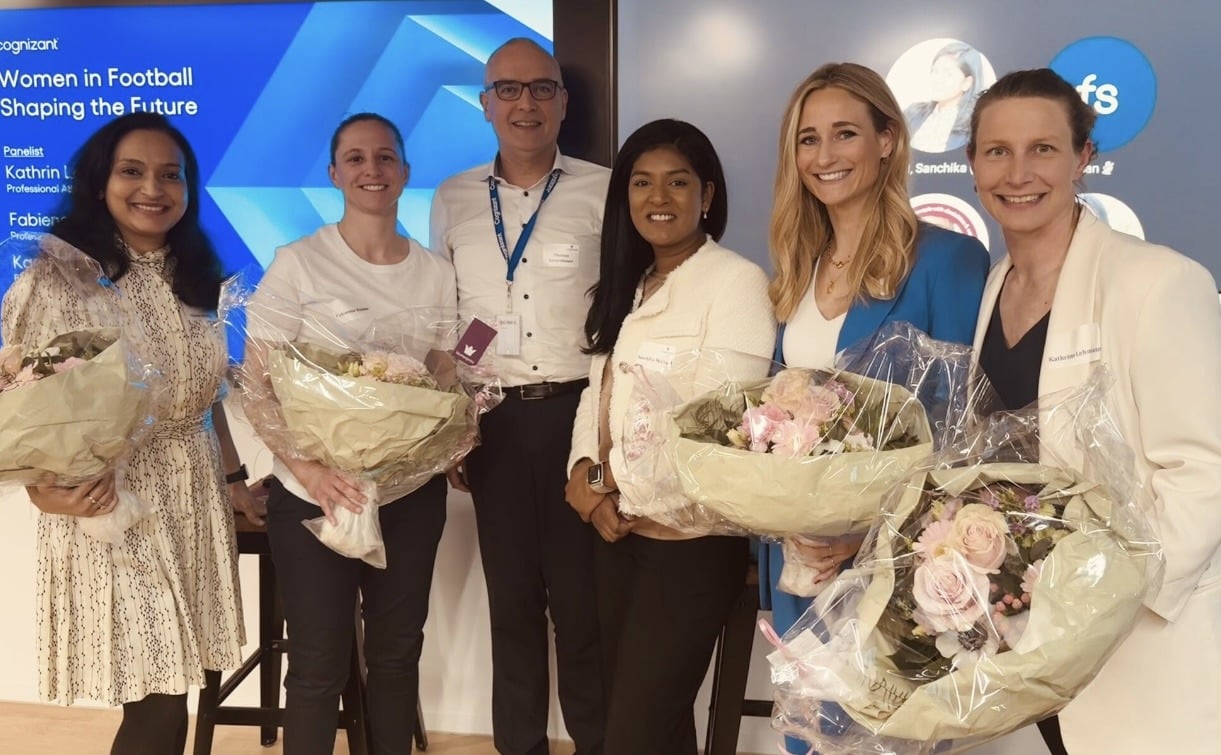The evening began with a warm welcome from Sanchika Michael from Cognizant, the lead for the Women Empowerment Group in Switzerland, who set the tone for the event. She emphasized the importance of resilience, teamwork, and challenging the status quo—qualities that are equally vital on the football pitch and in the corporate boardroom. Her heartfelt gratitude to Thomas Gassenbauer, Country Manager Switzerland, CEO, Board Member (Cognizant), for his support in bringing this vision to life highlighted the collaborative effort required to drive meaningful change.
The panel, moderated by Jennifer Arman, featured an impressive lineup of speakers: Kathrin Lehmann, a former professional football player and founder of a private university; Fabienne Humm, a former national football player balancing a corporate career; and Kamalika Chakraborty, a seasoned professional in banking and finance at Cognizant with a passion for running. Each panelist brought a unique perspective, blending their experiences in sports and business to shed light on the challenges and opportunities women face in these fields.
The Intersection of Football and Business
The discussion opened with a focus on the parallels between football and corporate life. Both arenas demand strategic thinking, effective communication, and the ability to perform under pressure. Kathrin, drawing from her dual expertise in sports and academia, highlighted the importance of creating opportunities for women to transition from athletic careers to roles in media, business, and leadership. She emphasized the need for innovative business models tailored to women’s football, which is still in its growth phase compared to men’s football.






Fabienne shared her journey of balancing a full-time corporate job with a national football career, a testament to the resilience and determination required to succeed in both worlds. Her story underscored the systemic challenges women athletes face, such as limited financial support and the need to juggle multiple roles. Kamalika, on the other hand, drew parallels between leadership in sports and business, emphasizing the importance of communication, teamwork, and setting clear goals.
Empowerment: A Collective Effort
Empowerment emerged as a central theme throughout the discussion. For Kamalika, empowerment means equal access to resources, representation, and the creation of environments where women are heard and respected. She stressed the importance of mentorship and collective progress, noting that empowered women bring diverse skills, empathy, and collaboration to the table.
Kathrin echoed this sentiment, defining empowerment as the courage to stand up for others and create spaces where women can thrive. She shared personal anecdotes from her football career, illustrating how small acts of support—like a teammate fighting to regain possession after a missed shot—can have a profound impact.
Fabienne’s perspective on empowerment highlighted the need for structural changes, such as policies that support women athletes and initiatives that encourage men to share caregiving responsibilities at home. She pointed out that true equality requires a shift in cultural norms, where women are not burdened with the dual expectations of excelling in their careers and managing household responsibilities.
Challenges and Opportunities
The panelists acknowledged the significant progress made in women’s football, particularly with FIFA’s increased investment and the growing popularity of events like the Women’s Euro 2025. However, they also highlighted the persistent challenges, such as the gender pay gap, limited infrastructure, and the lack of opportunities for women over 30 to continue participating in sports.
Kathrin’s initiative to organize football camps for women over 30 is a step toward addressing this gap. By creating inclusive spaces for women to engage in sports, she is challenging stereotypes and fostering a sense of community. Monica emphasized the need for policy changes that promote gender-neutral infrastructure and encourage girls to pursue non-traditional roles in STEM, sports, and business.
The Role of Mentorship and Role Models
The importance of strong female role models and mentorship programs was another key takeaway from the discussion. Kamalika shared how mentorship has been instrumental in her career, encouraging women to seek guidance both within and outside their organizations. Kathrin stressed the responsibility of role models to inspire and guide the next generation, while Fabienne highlighted the need for women to support each other and share their experiences openly.
Looking Ahead
As the event drew to a close, the panelists left the audience with a powerful message: empowerment is not an individual achievement but a collective effort. By breaking down barriers, challenging stereotypes, and creating inclusive spaces, we can pave the way for a future where women thrive in both football and business.
The conversation doesn’t end here. It is important to continue to champion diversity, advocate for equality, and inspire the next generation of leaders—on and off the field. Together, a thriving future for women everywhere can be shaped.
Binci Heeb
Read also: Women’s Day – Climbing the ladder





